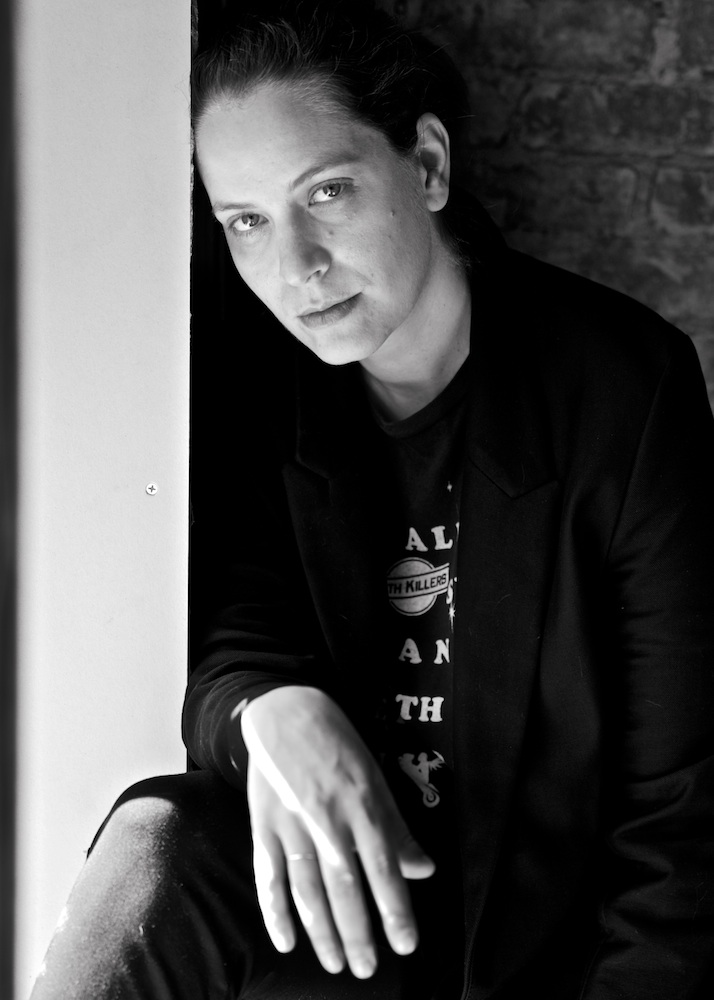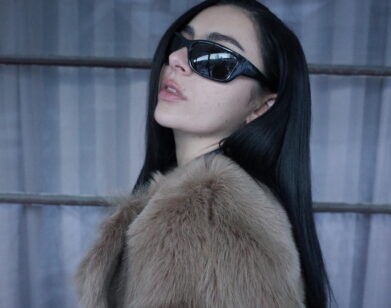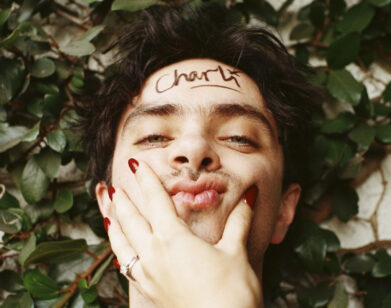Tannaz Hazemi, from Iran to Cannes

ABOVE: TANNAZ HAZEMI IN BROOKLYN, NEW YORK, MAY 2015. PHOTO: FRANK SUN. GROOMING: STEFANIE WILLMANN FOR RMS BEAUTY AT SEE MANAGEMENT.
“I was born the week of the American hostage crisis in Tehran,” explains writer-director Tannaz Hazemi. “Both of my parents are Iranian, and my mom spent a lot of time trying to get us out of there,” she continues. “Through a very long and complicated story that’s not completely legal, she smuggled me and my younger sister into East Germany and then across the boarder on a train to Sweden.”
Hazemi’s personal history is incredible. She arrived in Sweden as a refugee at the age of five, moved to Chicago at the age of 13, became a model at 15, left home at 16, published a book about music and moved to Milan at 19, hosted a VH1 breakfast show in her early 20s, and moved to Paris to become a full-time writer at the age of 24. She spoke no Swedish before she arrived in the country, no English before Chicago, no Italian before Milan, and no French before Paris. “I’ve spent my whole goddamn life try to learn a language,” she jokes. “It’s been haunting me until the last five years.” Don’t, however, expect an autobiography in the near future. “I don’t find it very interesting,” she says. “It’s so fun to make stuff up. You can have a little impetus from somewhere —something that happened to you or something that you feel—but the fun part is creating a character, creating a story, and seeing what happens.”
Now 35 and based in Brooklyn, Hazemi is currently screening her fourth short film, Before the Bomb, at The American Pavilion at the Cannes Film Festival. Set in scruffy suburban America, Before the Bomb follows 10-year-old Elsa (Sterling Jerins), who, with her mother passed out upstairs, acts as the adult in the family. In spite of its subject matter, the cinematography is not harsh and gritty: we see Elsa’s world through her eyes, and Elsa is determined to be happy (the film’s soundtrack includes a very apt Soko cover of “The Great Pretender“). It is Elsa’s optimism that makes the film all the more affecting.
We spoke with Hazemi before she left for Cannes. The last time she was at the festival, she was conducting interviews for TELE+, the now defunct Italian branch of Canal+.
BEFORE THE BOMB Trailer HD from tannaz hazemi on Vimeo.
GROWING UP… My dad had worked as a loan officer for a bank when we were in Iran. When we moved to the States, he worked for an airline. My mom was a translator. She learned languages really quickly when we were in Sweden. That’s how she got us out of the refugee camp. She sort of moved around jobs that had to do with understanding other people and listening to other people, but never anything artistic.
I didn’t watch a lot of movies growing up. When we moved to America it was the first time we had a television. There was no artistic inclination in the family. We never played music; we never went to movies. Neither of my parents has read any fiction. The only thing we would do is nature: we would go for walks; we would go swimming.
RETURNING TO IRAN: I assume that I can—my parents were not politically associated in anyway. But more than anything, the way that they see gay people and women, I wouldn’t want to go there right now.
THE BENEFITS OF BEING AN OUTSIDER: When you’re not part of something, you’re always looking at what’s going on. You’re not myopic. I feel like being an outsider has taught me to watch people, to listen to people. It’s made me aware of words and sentences and language. It’s forced me to pay attention.
A MODEL TEENAGER: Modeling got me out of Chicago, which is where I went to high school. My friend and I went to a mall and there was the Elite Model Look contest. They said, “Do you want to come and try out?” It was literally that. We tried out. We both got in. The next thing I know, I’m making enough money to buy booze with my friends, go out to TGI Fridays, and leave Chicago. I hated the fuck out of modeling. I hated every single second of it. It was one of the worst periods of my entire life. I couldn’t believe how little you needed to exist to model. The less you existed, the better you did. It was self-numbing. It was awful. I did everything I could to get out of it as soon as possible. But I’m very grateful that it got me out of Chicago.
LEARNING ON THE JOB: [My first short] Prometheus was literally made for 1,100 dollars, and that includes a 200-dollar parking ticket. A part of me always felt like, if you’re going to put a lot of money into something—and in my case with Before the Bomb, ask for a lot of money—you have a responsibility to know what you’re doing. I didn’t want to spend a lot of money on my first few shorts; I wanted to do them as cheaply as I could to learn. Once my shorts started to get into festivals and I started to be more aware of the format and every single aspect of filmmaking, I was like, “Okay, I think I’ve got an idea of how to pull this off.”
THE GENESIS OF BEFORE THE BOMB: My first girlfriend when I was 14 years old, her name was Ericka. She had been taken away from her abusive mother when she was 11. It was still very fresh in her mind. She was with her new adoptive parents and doing much better. I don’t remember the details of her story, but I do remember the feelings that it gave me. I fictionalized it, for sure, but a lot of the feelings come from her. I’ve sort of disassociated the two, but I wanted to recreate the strength and empathy that I felt for Ericka when she told me the story in this little girl. She wasn’t a weak person—she was very strong, she was very much in charge. She could laugh about it. This is going to sound really unreal, but she OD’d in her boyfriend’s bathroom at 18. It’s awful.
BECOMING A SCREENWRITING PROFESSIONAL: I wrote a script just hoping to be able to make money writing something, because none of my fiction writing ever worked out. I wrote short stories, didn’t get them published. I wrote a novel, couldn’t get it published. I really just wanted to be able to start a writing career. The other [feature] scripts I’ve written since then have been because a director or a production company has approached me with an idea and I’ve written it for them. I haven’t written anything feature-length for myself, except recently I started one for myself. It’s the accumulation of all the things I have seen in a good movie. I’ve taken very close notes, and I’ve built a machine. It’s fucking tight and it’s fast and it’s lean, and it’s got enough colorless metal to it where somebody could come in and make it their own. I’m definitely not directing it.
DIRECTING IS LIKE… When I direct my first feature, it’s going to be like when you fall in love. How many times do you fall in love in your life? It’s not that many. I will wait until I am so in love that I’m ready to direct a feature.
MY MENTOR: The one person I’ve run everything by in my writing career—in my film career—has been my best friend and my brother from another mother, Henry Alex Rubin. He’s right in there with me in everything I do. He’s a huge commercial director. Back in the day—I guess 15 years ago now—he did that documentary that was nominated for an Oscar called Murderball. That’s how he started his career.
UP NEXT: I have a lot of writing projects. I’ve been commissioned for two different scripts. One with an incredible director; the other with an incredible production company. One is pretty low budget, but the people attached are insane, and then the other is just going to be a lot of money and they’re trying to make it this huge thing. That’s what I’m focusing on. I have a short coming out that Vice is producing. We’re hoping to shoot that in September.
BEFORE THE BOMB IS CURRENTLY SCREENING AT THE CANNES FILM FESTIVAL. SOKO’S COVER OF THE GREAT PRETENDER IS AVAILABLE TO PURCHASE VIA iTUNES.






